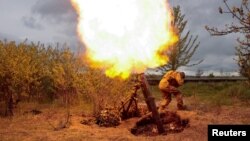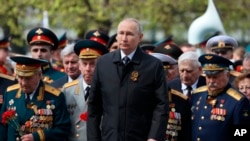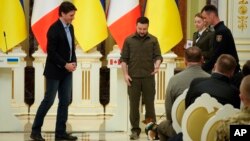Russian President Vladimir Putin on Monday blamed Western nations for his invasion of Ukraine, saying Russia acted in response to "an absolutely unacceptable threat next to our borders."
But the longtime Russian leader did not announce any change in Moscow’s military campaign or declare victory, suggesting that his 10-week offensive would continue with attacks on Ukrainian strongholds in the eastern part of the country after Russia failed to topple Ukrainian President Volodymyr Zelenskyy or capture the capital Kyiv.
Addressing a Red Square military parade commemorating the defeat of Nazi Germany in World War II, Putin spoke of Russia’s demands for security guarantees, which Russia made in the months ahead of its February 24 invasion even as it repeatedly insisted it had no plans to attack its neighbor. U.S. and NATO officials met with Russian officials multiple times but rejected certain Russian demands, such as Ukraine pledging it would never join NATO.
"NATO countries did not want to listen to us, meaning that they in fact had entirely different plans, and we saw this," Putin said Monday. "Openly, preparations were under way for another punitive operation in Donbas, the invasion of our historical lands, including Crimea."
In a rebuke, Zelenskyy likened Putin to Adolf Hitler, saying the Russian leader’s war against Ukraine was “repeating the horrific crimes of Hitler’s regime today.”
Putin drew parallels between the Soviet forces of the Second World War and today’s Russian forces in Ukraine, falsely casting Ukraine as Nazi-controlled, even though Zelenskyy is Jewish. Putin uses that false narrative to characterize the invasion as an operation to “denazify” the country, something Ukrainians see as an effort to destroy their country and culture. Ukraine and its Western allies say Putin launched an unjustified war and unprovoked war.
Putin acknowledged the loss of Russian military forces in his Ukraine offensive, saying the death of every soldier was a “grief for all of us” and promised government support for the families of the dead.
Ukrainian presidential adviser Mykhailo Podolyak said there was no rational reason for the war other than Russia’s "sick imperial ambitions."
"NATO countries were not going to attack Russia," Podolyak tweeted after the speech. "Ukraine did not plan to attack Crimea. The Russian military is dying, not defending their country, but trying to occupy another."
NATO reinforced its eastern flank, adding troops and equipment in member states, as Russia massed troops along the Ukrainian border and eventually launched its attack. Individual countries have also sent military equipment and weapons to Ukraine, but NATO leaders have repeatedly said the alliance’s troops and planes would not enter Ukraine.
In his own message Monday, Ukrainian President Volodymyr Zelenskyy said, "we have no doubt that we will win."
"Today we celebrate Victory Day over Nazism. We are our proud of our ancestors who together with other nations in the anti-Hitler coalition defeated Nazism. And we will not allow anyone to annex this victory. We will not allow it to be appropriated," Zelenskyy said.
"We won then. We will win now," he added.
As Russian forces focused attacks on eastern Ukraine’s Donbas region, a Russian bomb leveled a school in Luhansk province.
"As a result of a Russian strike on Bilohorivka in the Luhansk region, about 60 people were killed, civilians, who simply hid at the school, sheltering from shelling," Ukrainian President Volodymyr Zelenskyy said in a late Sunday video address.
Luhansk Governor Serhiy Haidai wrote on the Telegram messaging app that 30 people were rescued from the site.
Britain’s defense ministry said Monday that Russia has likely heavily depleted its stockpile of precision-guided munitions, forcing it to rely on older munitions that are less reliable and less accurate.
"Russia’s invasion of Ukraine has revealed shortcomings in its ability to conduct precision strikes at scale," the ministry said. "Russia has subjected Ukraine's towns and cities to intense and indiscriminate bombardments with little or no regard for civilian casualties."
Ukraine aid
In an interview with the Financial Times, European Union’s foreign policy chief Josep Borrell said EU capitals should consider seizing frozen Russian foreign exchange reserves in order to assist in efforts to rebuild Ukraine post-war.
"This is one of the most important political questions on the table: who is going to pay for the reconstruction of Ukraine?" Borrell told the Financial Times, adding that discussion over the money for "war compensations" should start and that it should come from Russia.
Borrell drew comparison to the U.S. seizure of Afghan assets following the Taliban’s takeover last year.
"We have the money in our pockets, and someone has to explain to me why it is good for the Afghan money and not good for the Russian money," Borrell said.
Zelenskyy met virtually Sunday with U.S. President Joe Biden and other Group of Seven leaders from Britain, Canada, France, Italy, Japan and Germany, who together head some of the world’s largest economies. The grouping has pledged billions of dollars in military aid to Ukraine.
Later, the White House said that Russian President Vladimir Putin "has failed in his initial military objective to dominate Ukraine — but he has succeeded in making Russia a global pariah."
"Today, the United States, the European Union and G-7 committed to ratchet up these costs" by imposing further sanctions targeting Russian state-controlled media, cutting off Russian oil exports to Europe and further curbing Russian trade to other countries.
Surprise visits
A day after crossing into Ukraine to meet with Ukrainian first lady OIena Zelenska and visit with schoolchildren, U.S. first lady Jill Biden met Monday with Slovakian President Zuzana Caputova in Bratislava to discuss what she said was "the support that the United States has for the people of Slovakia and Ukraine and how we stand together in helping the Ukrainian people."
Biden wrote in a guestbook that the United States and Slovakia share "a common devotion to helping those most in need."
She also told reporters that she had told President Biden after her visit to Ukraine "how much I saw the need to support the people of Ukraine" and about "the horrors and the brutality that the people I had met had experienced."
The United Nations says more than 5.8 million Ukrainians have fled the country since the Russian invasion began in late February, with nearly 400,000 going to Slovakia.
Canadian Prime Minister Justin Trudeau traveled Sunday to Kyiv to meet with Zelenskyy and then reopened the Canadian embassy in the embattled capital.
Top U.S. diplomats, including acting Ambassador Kristina Kvien, also returned to Kyiv as the United States prepares to soon reopen its embassy there.
Some information for this story came from The Associated Press, Agence France-Press and Reuters.








